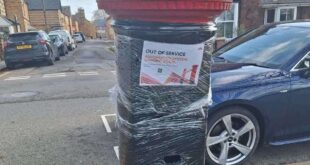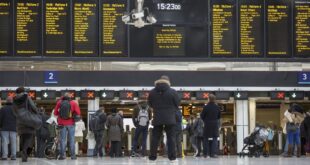With an electrified railway line running parallel to this route could this freight traffic be consolidated on to one or two train loads? The journey time could be quicker, plus the road and the environment would be saved from damage.
Presently there is a daily train on the Highland Line to Inverness carrying bulk supermarket goods, known loosely as “the Tesco Train” . Could there be a similar train between the Central Belt and North of England, with two-way traffic, possibly to be known as “the Parcels Train” or “the DPD Train”?
Also what happened to the suggested “Whisky Train” which was planned to accept 29 tanker-loads of whisky per day, thus reducing HGV traffic of the notorious A9 between the distilleries in the north and the bottling plants and distribution depots around Edinburgh and Glasgow?
Railways have been used to convey mail for almost 200 years, variously on passenger trains in guard’s vans, in Express Parcels trains, in Red Star wagons, and in the famous Travelling Post Offices, as recorded in WH Auden’s poem Night Mail and the 1936 British Transport documentary film.
The decision by Royal Mail to complete a modal shift and to discontinue the use of rail transport from October this year is another retrograde step in trying to save the environment. The network for letters and parcels is in place with central line-side collection and distribution depots north and south of the Border, and even dedicated fast Royal Mail trains (100mph multiple unit Class 325s), all currently helping to meet the net zero targets.
Small steps have been made to improve freight distribution by rail, including a new siding at Blackford for transportation primarily of spring water, and other track and infrastructure improvements in Inverness and Aberdeen.
To align ourselves with other European countries in the transportation of freight by rail much more could be done, especially if legislation forced operators to switch transport mode.
“Big hits” initially could include parcel and mail distribution, conveyance of water, whisky and other liquids, re-opening of railway oil terminals, and increased transportation of heavy goods such as aggregates, timber logs, bio-mass and wood pellets.
Transferring this freight from road to rail would accord with government policy and green objectives.
Let us see if the newly-elected UK Secretary of State for Transport is willing to stand up to the vested interests of the road transport lobby, thus helping to protect the environment and reduce the carbon footprint.
Robin M Brown, Milngavie.
READ MORE: Hold praise for Kate Forbes until we get action on Ardrossan Harbour
READ MORE: We have better things to spend money on than propping up Gaelic
Bring debating back to schools
LAST week Scotland’s schools debating team won the 2024 World Schools Debating Championship (“Scotland win World Schools Debating Championship in Serbia”, heraldscotland, July 26).
Freedom of speech, dialogue and debate are notions that universities appear to have replaced with no-platforming, disinviting invited speakers, trigger warnings and safe areas. A vital part of the purpose of education is to prepare young people to navigate the world and the impact it will have on them. The tools of reason and debate should therefore be an integral part of our educational system at an early stage.
Many young people do not know how to argue their case when faced with views that differ from their own. Every school should have a debating club, and every pupil should be a member and be given the tools and encouraged to use their critical thinking skills to take part. There should be inter-school debating contests, with a national final, with prizes for contestants and school. We owe it to our children to ensure they are better prepared.
As Logan Moss, a member of Scotland’s winning school debating team, said: ‘‘To be able to meet people from different countries and cultures who, nonetheless, share our passion for what we often feel to be a slightly odd, niche activity, was one thing, but more than this was being able to know that, in spite of the polarisation and social media-based wrangling that seems to have devoured today’s world, there is still a place among the young for reasoned critical discussion.’’
Doug Clark, Currie.
Pavement peril
I RECENTLY have had a new knee fitted, paid for privately as I couldn’t face a two-year wait on the NHS. Despite the operation being a complete success I’m still rather cautious on my feet.
On a visit to Glasgow this week I was shocked but not surprised about the appalling state of the pavements. The pavements are frankly not safe, with potholes and broken paving literally everywhere. It would not surprise me to learn that our A&E waiting times are partly caused by pavement accidents. However on the positive side there were some spiffy new cycle lanes. It’s well seen where pedestrians come in the Glasgow pecking order.
With the already over-flowing and smelly bins it’s such a joy to be back in my home city. Something seriously needs to be done.
Ian McNair, Cellardyke.

Sensible signs
GEORGE Rennie (Letters, May 27) makes a good case for the use of kilometres instead of miles. A main argument against change is the huge cost to government of repainting all road signs.
In Scotland, however, such repainting might be combined with the removal of the distracting to drivers place names in Gaelic.
That, in turn, would, however, require joined-up thinking, not something for which politicians are renowned.
David Miller, Milngavie.
Calculated benefits
GEORGE Rennie (Letters, July 27) and George Smith (Letters, July 30) raise a subject dear to my heart. The conversion of kilometres to miles on my driving holidays in France has been a major source of mental exercise over my driving lifetime, and one to which I attribute, at least in part to (apparently) not succumbing to dementia, at least not yet. The conversion rate of 0.62 miles to one kilometre is close enough to two-thirds of a mile to make a quick calculation quite easy and keeps me endlessly entertained.
For further refinement, if you have an analogue speedometer with a dual scale, it’s quite easy to use it as a Dalton computer to make time and distance calculations quite accurately.
John Jamieson, Ayr.


